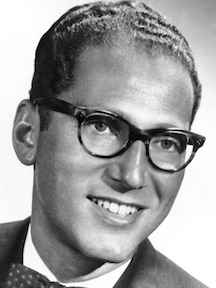By Hoda Fakhari
A mathematician, performer, and satirical lyricist, Tom Lehrer (ΦBK, Harvard College, 1946) changed the way people experienced popular music, science, and politics.
Remember the periodic table of elements? What about “The Elements” song that was famously performed by Daniel Radcliffe on The Graham Norton Show in 2010? The creative mind responsible for this innovative approach to a common chemistry lesson is none other than Lehrer himself. His rendition of the song can be viewed here.
“The Elements,” which garnered widespread popularity by musical enthusiasts and scientists alike, is only one sample of Lehrer’s transformative body of work. Throughout the height of his music career in the 1950s and 60s, Lehrer, who turned 90 this year, produced lyrics that comically reflected on current events while parodying the style of the popular music of his time.
Lehrer’s notable achievements began outside of the music scene. As a prodigy, he started undergraduate studies in mathematics at Harvard at the age of 15 and graduate studies at 18. His academic accomplishments garnered him election to Phi Beta Kappa, and his witty personality and musical talent earned him wide admiration on the Cambridge social scene. During his time at Harvard, Lehrer became known for his parodies at parties and eventually more formal functions. Realizing that his music had acquired a sizeable audience, Lehrer recorded his first album Songs by Tom Lehrer in 1953. He produced what was considered at the time to be an ambitious 400 copies of the record for distribution.
The public quickly took to his wit and catchy tunes. By 1960, Lehrer had released his second album More of Tom Lehrer, conducted sold-out performances in the Palace Theatre in London, and sold some 370,000 copies of his records internationally. In July 1959, he was featured in Time for his role in the emergence of the new “sick” comedy that combined social criticism with foolishness to harness a “highly disturbing hostility toward the world.” That hostility arose as a product of his views on civil rights, war, and environmentalism among other social and political issues.
No matter the subject, Lehrer never shied away from controversy. Instead, he confronted it head on, reminding people, as he is quoted to have said, that “bad weather always looks worse through a window.” His songs “So Long Mom” and “We Will All Go Together When We Go” tackle the subject of nuclear war in an impending World War III. “I Wanna Go Back to Dixie” goes “too far” in its mocking of racism in the South, and “Pollution” brings awareness to water and air pollution in the United States.
Along with his more upfront sociopolitical commentary, Lehrer directed his satire toward non-political issues such as love, math, and academia in songs like “Poisoning Pigeons in the Park,” “New Math,” and “Lobachevksy.” His mathematical training paired with his synthesis of diverse subjects into lyrical form is emblematic of the interdisciplinary emphasis on education in the liberal arts and sciences. “There’s something mathematically satisfying about music,” said Lehrer in an article in The New York Times, “notes fit together and harmony and all that. And mathematics has to do with abstractions and making connections.”
Despite his easygoing and forthright personality, Lehrer never truly took to the life of a public figure, and he abruptly ended his music career in the 1970s, instead choosing to escape the Boston cold and return to teaching math and music at the University of California, Santa Cruz.
His entire body of work was officially completed with 37 songs that resonate with established academics and rebellious teens alike. As described in Nature, “[Lehrer’s] scathing creations remain one of the most original — not to mention mathematically elegant — bodies of artistic work to come out of the United States in the twentieth century.”
Hoda Fakhari is a senior at the University of Illinois at Chicago majoring in biochemistry and English. She became a member of Phi Beta Kappa during her junior year. The University of Illinois at Chicago is home to the Iota of Illinois Chapter of Phi Beta Kappa.




